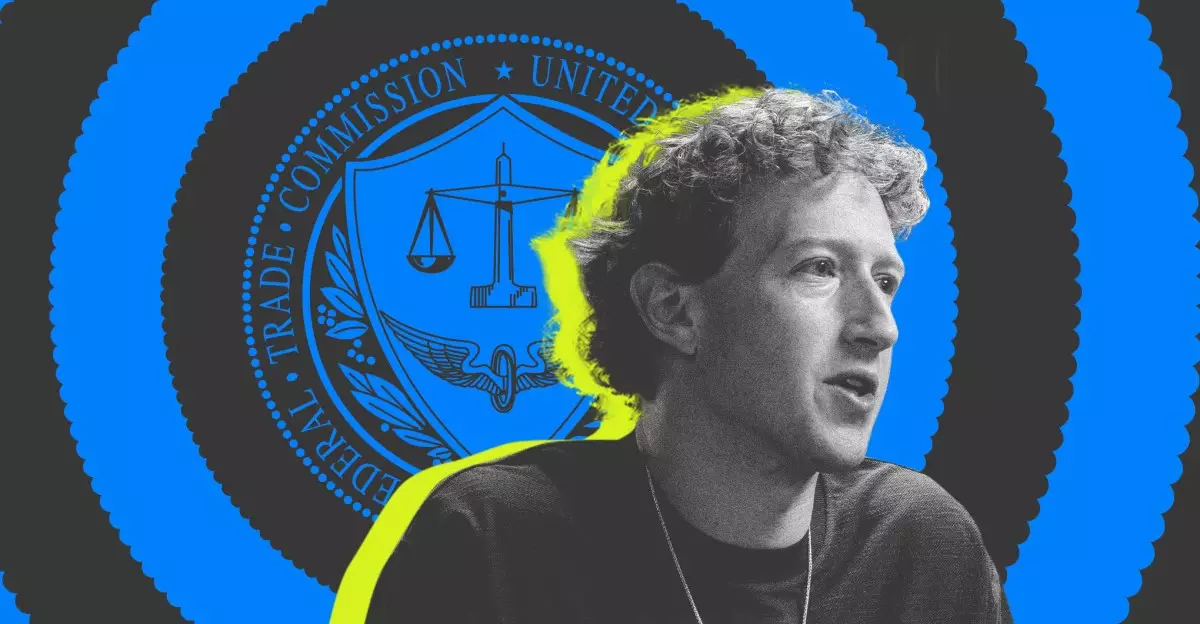Meta, the brainchild of Mark Zuckerberg, is a testament to the intersection of innovation and strategic foresight in the realm of social media. As we delve into the evolution of this colossal platform, it’s vital to reconsider the myriad paths Zuckerberg could have taken. What if he had separated Instagram as an independent entity? What if Snapchat had come under Meta’s roof, drastically altering the competitive landscape? These speculative questions frame a larger narrative about the decisions that have defined Meta and the implications of those choices on the digital space we inhabit today.
Zuckerberg has always been at the epicenter of technological change, casting a shadow that looms over competitors, regulators, and users alike. His ongoing testimony amidst a crucial antitrust case brought forth by the Federal Trade Commission (FTC) reveals not just the defense of Meta’s market behavior, but sheds light on the visionary ambitions that have fueled the company’s expansion. In a landscape where social media connectivity is paramount, understanding the motives behind acquisitions becomes essential in grasping the very nature of competitive strategy in the tech industry.
Strategic Acquisitions or Antitrust Violations?
At the crux of the FTC’s case lies the assertion that Zuckerberg’s aggressive acquisition strategy stifled competition. By absorbing major players like Instagram and WhatsApp, the argument posits that Meta arguably built a monopoly in personal social networking. During his extensive testimony, Zuckerberg was tasked with discussing this fluid market, resisting simplistic categorizations of competition. The notion that competition comes from platforms such as TikTok and iMessage highlights the dynamic nature of the market. Yet, one must ponder: does the constant evolution of digital interaction truly allow for a monopoly, or does it demand a redefinition of market boundaries?
Zuckerberg’s assertions—that Meta’s brand strategies, such as portraying Facebook as a connector among friends, evolve based on marketing tests—demonstrate the intricate relationship between consumer perception and corporate strategy. The FTC’s emphasis on the distinction between Facebook’s social utility and LinkedIn’s professional networking service illuminates an essential debate about the role of intent behind acquisitions. If Meta is determined to connect users across diverse platforms, does that make it an innovator or a monopolizer?
Internal Dialogues and Alternate Realities
The courtroom has unveiled a treasure trove of internal communications among Meta executives, revealing the fear, ambition, and uncertainty that accompany such grand decisions. Zuckerberg’s musings about potentially wiping out users’ friends lists to “return to joy” unveils a rather unconventional approach to user experience. Perhaps it underscores an embedded ambition in Meta’s ethos—how can one redefine user engagement amidst perceived competition? By contemplating radical changes, Zuckerberg highlights the delicate balance between user satisfaction and corporate strategy.
Consider the hypothetical scenario of Meta acquiring Snapchat in 2013—would it have fundamentally changed the trajectory of digital communication? Zuckerberg’s candid reflections suggest that managing Snapchat’s expansive growth would have positioned Meta as an even larger threat in the social media sphere. In a world punctuated by rapid tech advancements, it’s essential to assert that these decisions shape not only corporate trajectories but also user experiences at large.
The Elastic Nature of Competition
At the heart of this unfolding narrative is a critical observation: the definition of competition itself is elastic. Zuckerberg’s assertion that he sees the social networking landscape as one devoid of rigid boundaries reflects a keen understanding of digital evolution. Every platform, from TikTok to YouTube, presents different value propositions for users, all vying for attention. This fluidity speaks volumes about the nature of monopolistic accusations – instead of restricting competition, might these acquisitions be viewed as a survival strategy in an ever-changing digital landscape?
By presenting the FTC with insights into his thought process—which includes suggestions such as developing an entirely ad-based feed—Zuckerberg articulates the precarious balance that companies must maintain between monetization and user satisfaction. This balance points to a more profound issue within the tech sector: can sustained user loyalty exist in a world inundated with ad-driven platforms? It’s a problem that doesn’t merely encapsulate Meta’s journey; instead, it transforms into a wider indictment of the social media industry itself.
Beyond the Courtroom
As Zuckerberg continues to assert his narrative amid legal challenges, the broader implications for the tech sector echo loudly. The struggle against the FTC is not merely about retaining Instagram and WhatsApp; it is also emblematic of a generation grappling with the intersection of innovation, ethics, and competition. The outcome of this case might reshape the foundational principles governing digital social interaction. Social media exists in a dynamic ecosystem, and how companies navigate competition, regulation, and user engagement will define the next era of both corporate and consumer experience in Silicon Valley and beyond.

